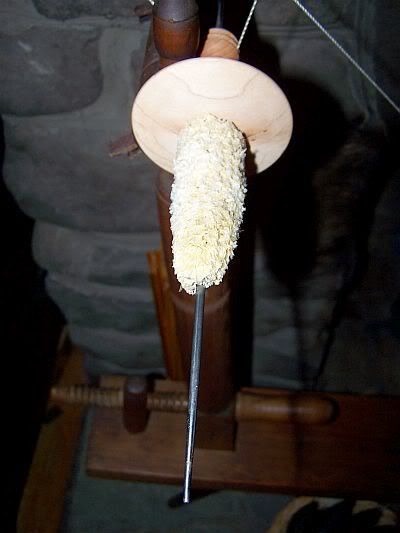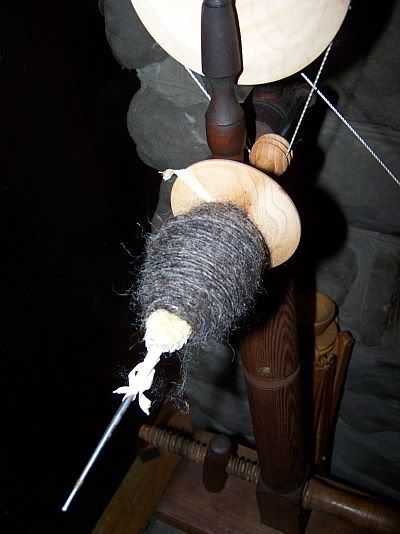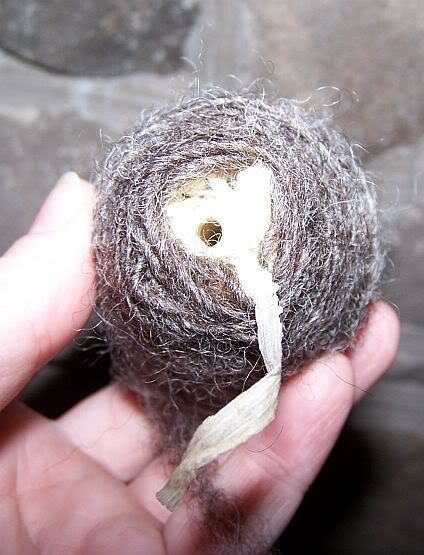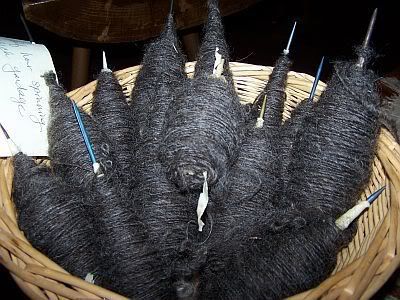I've started to use the dried ears of sweet corn that we grew, to feed to the chickens as a treat. They enjoy it. We ate the choice 10 inch ears this past summer, so the ones that I saved for drying are smaller, and some not fully formed. In the morning, when I let the chickens out to range, I grab a ear or two of the dried corn. I twist the cob in my gloved hands to release the kernels, and the chickens gather around my feet to snatch them up as they fall to the ground.
I am left with a clean white dry corn-cob. I have been wanting to use a corn-cob on my Great Wheel spindle, to serve as a bobbin. Quite some time ago, I had read that this was a common practice. I didn't reference it, and I'm sorry. However, I did find this from Project Gutenberg:
When the corn was shelled, the cobs were not carelessly discarded or disregarded. They were stored often in a lean-to or loft in the kitchen ell; from thence they were brought down in skepes or boxes about a bushel at a time.
The yarn might be wound directly upon the wooden spindle as it was spun,
or at the end of the spindle might be placed a spool or broach which
twisted with the revolving spindle, and held the new-spun yarn. This
broach was usually simply a stiff roll of paper, a corn-cob, or a roll
of corn-husk.
It worked rather nicely! There were no problems winding on, and it slid off easily. I did have to use a piece of husk as the base because the spindle didn't grip the inside of the cob. This would be a nice touch for folks to see at historical demos. I will save a few nice cobs for just such an occasion.
In the meantime, I think I will use up the ones I have because I am running out of dpns to hold the other cops in shape until I am ready to ply. I have a bit more to go before this pound is spun.







12 comments:
Fascinating.
Now. Plying?
Seems like plying off of these would be easier then other methods, because you could impale them onto a smaller diameter rod than the spindle.
..perhaps they brought the corn cobs down in bushels to also use for fuel for cooking fires?
My grandmother said she kept a basket by her cook stove, and back in the day when I cooked exclusively on wood, I liked them as a fuel for their slow burn.
Lovely yarn!
Cool! I'd only ever heard of the outhouse uses for corncobs. :-)
Yes, they did use them in the stove as well as the smoke house...they were said to make a nice flavor for the hams and bacon. I'm sure they found many uses for them.
I'm trying to spin all the singles before I ply this time..I've a few more ounces to go...
If I ever get a great wheel, I am going to try this! So much nicer than ol' plastic straws....
Spinning onto corn cobs, sounds really fun! Lovely yarn, look forward to seeing it in its plyed glory!
You just never know what you might learn when you go blog surfing.
Interesting post. DH and I have been wondering what we would do with corn cobs if we had them.
Looks like they work pretty well, too--that's a very productive spinning basket in the last photo. :-)
I am wondering what you have in mind for this yarn...you must have thought about it by now.
This is really interesting! The history of reuse-and-recycle is one of those things that's probably mostly lost in this world of buy-and-throw-away.
Mother nature provides what we need! Perfect for a demonstration of the wheel.
Post a Comment